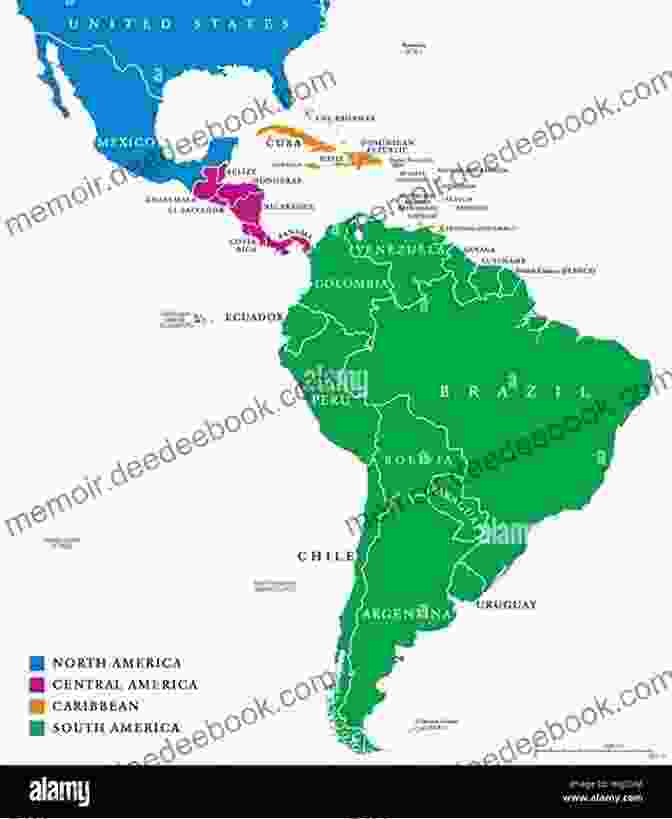Progress Problems and Prospects of Alternative Regionalism in Latin America and the Caribbean

Alternative regionalism has emerged as a significant phenomenon in Latin America and the Caribbean (LAC) in recent decades. It refers to the formation of regional blocs and initiatives that prioritize cooperation and integration based on shared values, principles, and objectives, often distinct from traditional models of regionalism. This article examines the progress, problems, and prospects of alternative regionalism in the region, highlighting its key characteristics, achievements, challenges, and future outlook.
5 out of 5
| Language | : | English |
| File size | : | 3206 KB |
| Text-to-Speech | : | Enabled |
| Enhanced typesetting | : | Enabled |
| Print length | : | 329 pages |
| Screen Reader | : | Supported |
| X-Ray for textbooks | : | Enabled |
Key Characteristics of Alternative Regionalism in LAC
Alternative regionalism in LAC is characterized by several key features that distinguish it from traditional or neoliberal approaches to regional integration. These include:
- Emphasis on Social and Political Objectives: Alternative regionalism places a strong emphasis on social justice, equity, democracy, and human rights, aiming to promote inclusive development and reduce regional disparities.
- Regional Identity and Autonomy: It seeks to foster a sense of regional identity and autonomy, based on shared values and a desire for greater self-determination and independence from external powers.
- Rejection of Neoliberalism: Alternative regionalism often rejects the neoliberal economic policies that dominated the region in the 1990s and 2000s, advocating for alternative development models that prioritize social welfare and environmental sustainability.
- Emphasis on South-South Cooperation: It promotes cooperation and solidarity among countries of the global South, including those in LAC, as a means of countering Northern dominance and fostering economic and political empowerment.
Achievements of Alternative Regionalism in LAC
Alternative regionalism has made significant achievements in LAC, contributing to regional cooperation and integration in several areas:
- Trade and Economic Integration: Regional blocs such as the Bolivarian Alliance for the Peoples of Our America (ALBA) and the Union of South American Nations (UNASUR) have facilitated trade and economic cooperation among member countries, reducing tariffs and promoting regional value chains.
- Social and Cultural Cooperation: Alternative regionalism has fostered cooperation in areas such as education, healthcare, and culture, promoting social development and cultural exchange among member countries.
- Political Cooperation: Regional organizations like ALBA and the Community of Latin American and Caribbean States (CELAC) have provided a platform for political cooperation, allowing member countries to coordinate their positions on regional and global issues.
- Reduced External Dependency: Alternative regionalism has contributed to reducing the economic and political dependence of LAC countries on external powers, particularly the United States.
Problems and Challenges of Alternative Regionalism in LAC
Despite its achievements, alternative regionalism in LAC faces several challenges and problems that limit its effectiveness and sustainability:
- Lack of Coherence and Coordination: The multiplicity of regional blocs and initiatives in LAC can lead to fragmentation and lack of coordination, making it difficult to prioritize and implement effective policies.
- Economic and Institutional Weaknesses: Many countries in the region face economic and institutional weaknesses that hinder their full participation in and benefit from alternative regionalism.
- Ideological and Political Differences: Ideological and political differences among member countries can lead to tensions and divisions within regional blocs, impacting their ability to reach consensus and implement joint initiatives.
- External Pressures: External powers, particularly the United States, can exert pressure on LAC countries and regional organizations to limit the scope and objectives of alternative regionalism.
Prospects for Alternative Regionalism in LAC
The future of alternative regionalism in LAC is uncertain and depends on a range of factors, including the political and economic situation in the region and the global context. However, there are several reasons to believe that it has the potential to play a continued significant role in the region:
- Continued Demand for Regional Cooperation: Despite challenges, there remains a strong demand for regional cooperation and integration in LAC, driven by the need to address common challenges and pursue shared goals.
- Regional Identity and Common Values: The shared history, culture, and values of LAC countries provide a basis for continued regional cooperation and the development of alternative regionalism.
- Emergence of New Regional Powers: The rise of new regional powers such as Brazil and Mexico can provide leadership and support for alternative regionalism.
- Global Context: Global trends such as the rise of China and the decline of US hegemony create opportunities for LAC countries to pursue alternative forms of regionalism.
Alternative regionalism in LAC has made significant progress in promoting cooperation and integration in the region. However, it faces several challenges and problems that need to be addressed to ensure its continued effectiveness and sustainability. Despite these challenges, alternative regionalism has the potential to play a continued significant role in the future of LAC, contributing to the region's development, autonomy, and independence.

- Cepal. (2017). Panorama of Latin American and Caribbean regional integration: progress, challenges, and perspectives. United Nations Economic Commission for Latin America and the Caribbean.
- Hirst, M. (2014). The limits of "progressive" regionalism in Latin America. Third World Quarterly, 35(5),828-844.
- Karl, T. L. (2007). The new regionalism in Latin America: a review of the literature. Cooperation and Conflict, 42(2),147-176.
- Roffe, P. (2015). Alternative regionalism in Latin America: towards a new paradigm? International Affairs, 91(5),1097-1113.
5 out of 5
| Language | : | English |
| File size | : | 3206 KB |
| Text-to-Speech | : | Enabled |
| Enhanced typesetting | : | Enabled |
| Print length | : | 329 pages |
| Screen Reader | : | Supported |
| X-Ray for textbooks | : | Enabled |
Do you want to contribute by writing guest posts on this blog?
Please contact us and send us a resume of previous articles that you have written.
 Chapter
Chapter Text
Text Library
Library Paperback
Paperback Magazine
Magazine Newspaper
Newspaper Paragraph
Paragraph Sentence
Sentence Glossary
Glossary Bibliography
Bibliography Preface
Preface Footnote
Footnote Scroll
Scroll Codex
Codex Bestseller
Bestseller Classics
Classics Library card
Library card Autobiography
Autobiography Reference
Reference Encyclopedia
Encyclopedia Dictionary
Dictionary Thesaurus
Thesaurus Narrator
Narrator Character
Character Resolution
Resolution Catalog
Catalog Card Catalog
Card Catalog Borrowing
Borrowing Archives
Archives Periodicals
Periodicals Study
Study Scholarly
Scholarly Reserve
Reserve Academic
Academic Reading Room
Reading Room Interlibrary
Interlibrary Literacy
Literacy Study Group
Study Group Thesis
Thesis Book Club
Book Club Julia Mccoy
Julia Mccoy Thomas G Mahnken
Thomas G Mahnken Pam Powers
Pam Powers Don Linn
Don Linn Paul Compton
Paul Compton Greg Pond
Greg Pond Rodolfo Pardi
Rodolfo Pardi Richard Miniter
Richard Miniter Bruno Palvarini
Bruno Palvarini Sara Lamb
Sara Lamb Willa Reece
Willa Reece Destiny O Birdsong
Destiny O Birdsong Patrick Brislan
Patrick Brislan Hawthorne Classics
Hawthorne Classics George F Kennan
George F Kennan Kyle Shelton
Kyle Shelton Pieter Waterdrinker
Pieter Waterdrinker Mary Lou Weisman
Mary Lou Weisman Hereward Senior
Hereward Senior L M Bogad
L M Bogad
Light bulbAdvertise smarter! Our strategic ad space ensures maximum exposure. Reserve your spot today!
 John UpdikeFollow ·4.3k
John UpdikeFollow ·4.3k William ShakespeareFollow ·9.4k
William ShakespeareFollow ·9.4k Francisco CoxFollow ·7.8k
Francisco CoxFollow ·7.8k Charles DickensFollow ·3.6k
Charles DickensFollow ·3.6k Eddie BellFollow ·17.8k
Eddie BellFollow ·17.8k Scott ParkerFollow ·19k
Scott ParkerFollow ·19k Felix HayesFollow ·11.4k
Felix HayesFollow ·11.4k Colin FosterFollow ·2.9k
Colin FosterFollow ·2.9k

 Vernon Blair
Vernon BlairHow to Get a Woman to Pay for You: A Comprehensive Guide...
In the modern dating...

 Levi Powell
Levi PowellPrinciples and Theory for Data Mining and Machine...
Data mining and machine learning are two...

 Andrew Bell
Andrew BellMirrors For The Mind: Milestones In Discovery And...
Mirrors have been a part of human history...

 Alec Hayes
Alec HayesDelving into Natural Language Processing with Java and...
Natural Language Processing (NLP) is an...
5 out of 5
| Language | : | English |
| File size | : | 3206 KB |
| Text-to-Speech | : | Enabled |
| Enhanced typesetting | : | Enabled |
| Print length | : | 329 pages |
| Screen Reader | : | Supported |
| X-Ray for textbooks | : | Enabled |
















